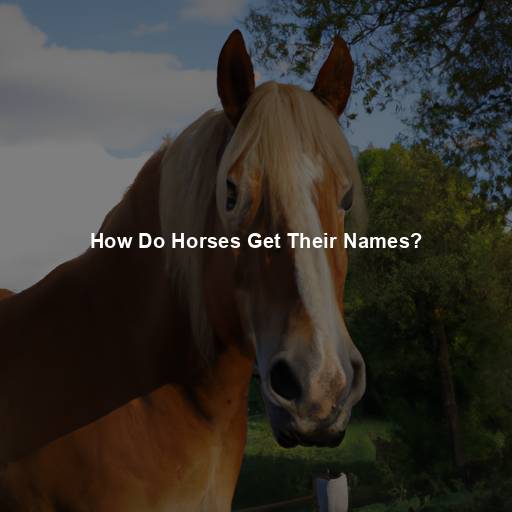Do Horses Know How to Get Home?
Last Updated on November 6, 2023 by Evan
Contents
- 1 Unraveling the Mysteries of Equine Navigation
- 2 The Role of Memory and Learning
- 3 Understanding Equine Navigation: The Way Forward
- 4 A Testament to Their Remarkable Abilities
- 5 The Intricacies of Equine Homing
- 6 The Unending Wonder of Equine Navigation
- 7 FAQs
Horses have long captivated our imagination with their beauty, grace, and intelligence. These majestic creatures have been our companions, partners in work and sport, and trusted friends for centuries. But amidst their many remarkable qualities, one question has intrigued equestrians and researchers alike: Do horses possess an innate ability to find their way back home?
The Instinctual Nature of Horses
Before delving into the intricacies of equine navigation, it is essential to understand the instinctual nature of horses. As prey animals, horses have developed a keen sense of spatial awareness and survival instincts. Their ability to detect potential threats and navigate unfamiliar terrain has been honed over generations.
Keen Observation Skills
In the vast expanse of their world, horses possess an uncanny ability to absorb every intricate detail that unfolds before them. With their keen senses, they capture the essence of their surroundings with unwavering attention. From the majestic sway of distinct trees to the enigmatic formations of rocks, these equine beings navigate their surroundings like enigmatic explorers.
Mental Map Creation
Through repeated exposure to specific routes, horses create mental maps of familiar territories. They remember the sequence of turns, landmarks, and distances, enabling them to navigate these routes with ease. This ability to form mental maps contributes to their homing instincts.
Homing Instincts: Nature or Nurture?
The question of whether horses possess an innate homing instinct or acquire navigation skills through experience remains a topic of debate among experts. While some argue that horses are born with an inherent ability to find their way home, others believe that their navigational skills are primarily learned.
Instinctual Homing Ability
Advocates of the innate homing instinct theory propose that horses possess an inherent compass-like sense, guiding them back to familiar territory. They argue that this ability is rooted in their evolutionary history as migratory animals, where returning to a known location ensured their survival.
On the contrary, proponents of the learned navigation skills theory contend that horses acquire their homing abilities through experience and exposure to specific routes. They argue that horses rely on memory, associative learning, and familiar landmarks to find their way back home.
Scientific Studies and Anecdotal Evidence
Explorers of equine enigmas have embarked on a formidable journey, delving into the depths of horse navigation. Merging empirical investigations with captivating tales, these scholarly explorations unveil a tapestry of intricacies, unraveling the enigmatic prowess horses possess in finding their way home.
Sensory Perception and Spatial Awareness
Research has shown that horses possess exceptional sensory perception, including acute hearing and vision. These sensory abilities enhance their spatial awareness and aid in their navigation. Additionally, studies have suggested that horses may possess a magnetic sense, allowing them to detect subtle changes in the earth’s magnetic field and orient themselves accordingly.
Familiarity and Route Recognition
Anecdotal evidence suggests that horses often rely on familiar routes and landmarks when finding their way home. Owners have reported instances where horses have taken alternative routes or detours when their usual path was obstructed. This behavior indicates that horses possess the ability to recognize and adapt their navigation strategy based on their surroundings.
Long-Distance Journeys
Remarkable stories of horses embarking on long-distance journeys and finding their way back home have fascinated horse enthusiasts for years. These accounts highlight the incredible navigational abilities of horses, often defying logical explanations. While some attribute these feats to a combination of innate instincts and sensory perception, others suggest that horses may rely on their strong bond with their human companions to guide them back home.
The Role of Human Influence
While horses may possess remarkable homing abilities, it is important to acknowledge the role of human influence in their navigation. Horses are highly social animals, and their bond with their human caregivers plays a significant role in their ability to find their way home.
Trust and Bonding
Horses form deep emotional connections with their human companions. This bond fosters trust and reliance, enabling horses to navigate unfamiliar territory with confidence. The presence of a familiar human can provide reassurance and guidance during challenging journeys.
Communication and Guidance
Human cues and vocal commands can also assist horses in finding their way home. Horses are highly attuned to human communication and can interpret subtle signals from their riders or handlers. Clear direction and guidance from humans can enhance their navigation abilities and help them navigate complex routes.
Familiarity and Exposure
As any equestrian enthusiast knows, horses possess an intriguing ability to master their surroundings. It has been observed that these noble creatures exhibit a remarkable penchant for successful navigation, particularly in areas they have become well-acquainted with. The intricate workings of their equine minds are such that the more time they spend in a specific locale, the more intricately their mental map unfolds, granting them a bewildering capacity to maneuver effortlessly. Having ingrained familiarity with the terrain, landmarks, and resources at their disposal, horses hold an undeniable edge when it comes to finding their way back to the comfort of their stables.
Terrain and Landmarks
The way a landscape is shaped has a profound impact on a horse’s knack for finding its way around. Eye-catching features like unique trees, rock formations, or even bodies of water act as signposts that help horses figure out which direction to gallop in. Moreover, these magnificent creatures may utilize the lay of the land, like hills and valleys, to swiftly maneuver through their surroundings. It’s a fascinating dance between nature and instincts that keeps horses confidently exploring the world.
Scent and Odor
Horses have a remarkable sense of smell, and they can detect scents over long distances. They may use familiar scents, such as those from their home barn or pasture, to guide them back. Scent trails left behind by other horses or even their own hooves can also provide valuable information for navigation.
Time of Day and Weather Conditions
The fascinating ways in which environmental factors sway a horse’s penchant for finding its way leave us in awe. As the sun graces the sky, these majestic creatures are gifted with the art of vision, allowing them to seamlessly assess the world around them. Nevertheless, as darkness shrouds the earth or a whisper of mist descends upon their path, horses gracefully tap into their heightened senses—listening fervently and inhaling scents with bated breath—to unravel the enigmatic trails that lay before them. And lest we forget, the capriciousness of weather, with its torrential rains, mystical fogs, and whimsical snowflakes only to bewilder these equestrian navigators as they embark on their perplexing journeys.
The Role of Memory and Learning
One cannot underestimate the profound impact that memory and learning have on a horse’s remarkable ability to navigate its way back home. These magnificent creatures possess an awe-inspiring capacity for recollection, allowing them to store and retrieve information from their past experiences. Through the lens of their surroundings, horses become avid learners, absorbing knowledge that serves as a guiding compass on their journey homeward.
Associative Learning
In the fascinating world of equine cognition, horses have showcased their incredible ability to create lasting connections between specific routes and positive experiences. It’s captivating to witness how these majestic creatures can reinforce their memories of certain paths by associating them with rewards, be it tasty treats or heartfelt praise. This phenomenon highlights the remarkable capacity of horses to not only recall these cherished locations but also navigate their way back to them, leaving us marveling at their cognitive prowess.
Social Learning
Horses are highly observant animals and can learn from watching and interacting with other horses. They may follow the lead of a more experienced companion when navigating unfamiliar territory, relying on their guidance and expertise.
Trial and Error
When it comes to finding their way around, horses have a fascinating approach: trial and error. They fearlessly venture down different paths, closely observing the results, and then use this valuable knowledge to fine-tune their navigation strategies. Thanks to this adaptive learning process, these majestic creatures become true masters of finding their way through the world. It’s a captivating journey of exploration and refinement that keeps us mesmerized by their intelligence.
While much progress has been made in understanding the navigation abilities of horses, there is still much to discover. Further research and studies can provide deeper insights into the mechanisms behind equine navigation, shedding light on the intricate workings of their homing instincts.
Scientific Studies
As we delve deeper into the world of equine understanding, the realm of sensory perception beckons with all its enigmatic allure. A tantalizing inquiry into the mysterious realm of horses’ minds would be to fathom their ability to perceive magnetic fields and decipher the cryptic environmental cues surrounding them. Adventures in cutting-edge tracking technologies allow us to witness the enigmatic routes paved by these majestic creatures as they embark on their journeys, teasing us with their bewitching wanderings.
Collaborative Research
Collaboration between equestrians, researchers, and horse owners can contribute to a broader understanding of equine navigation. Sharing anecdotal evidence, experiences, and observations can help identify patterns and commonalities among horses’ navigation strategies.
Training and Bonding
Have you ever wondered about the mysterious connection between humans and horses? It’s a bond that goes beyond words, grounded in the art of training and the power of positive reinforcement. By embracing trust, clear communication, and consistent methods, we can unlock the true potential of this magnificent creature. Imagine the awe-inspiring sight of a horse gracefully navigating through challenging situations, a testament to the strength of our unique connection.
A Testament to Their Remarkable Abilities
The enigma surrounding the true essence of horses’ navigational prowess persists, leaving us in a state of bewilderment. As we delve into the depths of their extraordinary capacity to find their way back home, a myriad of possibilities emerge. Perhaps it is their astute awareness of their surroundings, their seemingly innate ability to create intricate mental maps, or even their reliance on the guidance of humans that elevates their navigational prowess to unparalleled heights. Regardless of the underlying truth, the perplexing phenomenon of horses’ uncanny sense of direction continues to captivate and astonish us.
As our exploration of equine navigation unfolds, one cannot help but be captivated by the enigmatic nature of these majestic creatures. Their ability to navigate through unknown territories with unmatched resilience, adaptability, and intelligence is a constant source of fascination and awe. The bond between humans and horses transcends mere companionship, serving as a remarkable testament to the profound connection and mutual understanding that arises from embarking on shared journeys and embracing the universal longing for a place to call home.
When it comes to a horse’s navigation skills, it’s not just about what they are born with or how humans shape their abilities. There’s another layer to consider – external factors. These elusive forces have the power to either help or hinder a horse’s journey back home, adding an element of unpredictability to an already complex equation. Understanding and unraveling the influence of these external factors is a perplexing task, offering a fascinating glimpse into the enigmatic world of equine navigation.
Distractions and Disruptions
Distractions or disruptions in the environment can impede a horse’s navigation abilities. Loud noises, unfamiliar objects, or sudden changes in the surroundings can cause horses to become disoriented or lose their focus, making it more challenging for them to find their way home.
Emotional State
The connection between a horse’s emotional well-being and its navigation skills is truly fascinating. It’s intriguing to discover that horses under stress, anxiety, or fear might encounter difficulties when trying to stay focused and navigate in their surroundings. On the other hand, it’s remarkable how horses that remain calm, relaxed, and confident effortlessly navigate through their environment and effortlessly find their way back home. The intricate dynamics and impact of a horse’s emotional state on its navigation abilities continue to astound researchers and equestrian enthusiasts alike.
Training and Experience
The level of training and experience a horse has received can impact its navigation skills. Well-trained horses that have been exposed to various environments and navigation challenges are likely to be more adept at finding their way home compared to inexperienced or inadequately trained horses.
Human Intervention
When it comes to horses and their innate sense of direction, it’s a fine line between offering a helping hand and stifling their instinctive navigation prowess. While a human’s guidance can definitely lend a hand in guiding these magnificent creatures back home, we must be cautious not to overdo it and rob them of their own natural abilities. Striking the perfect balance between assisting them and allowing them to rely on their own instincts and well-honed navigation skills is of paramount importance.
The Intricacies of Equine Homing
The complex nature of equine homing continues to fascinate researchers, equestrians, and horse enthusiasts alike. Numerous theories and hypotheses have emerged to explain this phenomenon, offering different perspectives on the underlying mechanisms of horse navigation.
Cognitive Mapping
Cognitive mapping theory suggests that horses create mental representations of their environment, incorporating spatial relationships and landmarks. This internal cognitive map enables them to navigate back to familiar locations. Further research is needed to understand the intricacies of this cognitive mapping process in horses.
Sensory Integration
When it comes to horses, it seems their ability to navigate is more complex than meets the eye – or should I say, meets the senses. Experts believe that these majestic creatures have a unique talent for blending different sensory inputs, like what they see, hear, and even smell, to create a holistic understanding of their environment. This mesmerizing phenomenon allows horses to maneuver their way through the world with grace and precision.
Social and Emotional Factors
Social and emotional factors can also influence a horse’s navigation abilities. The presence of familiar herd members or a trusted human companion can provide a sense of security and facilitate navigation. Additionally, the emotional bond between a horse and its rider or handler can enhance communication and cooperation, aiding in successful navigation.
Genetic Predisposition
Some studies suggest that there may be a genetic component to equine navigation abilities. Certain horse breeds or individuals within a breed may possess genetic traits that contribute to their superior navigation skills. Exploring the genetic basis of navigation in horses could provide valuable insights into this intriguing phenomenon.
The question of whether horses possess an innate ability to find their way home continues to inspire curiosity and wonder. While we may never fully unravel the mysteries of equine navigation, our ongoing exploration and research contribute to our understanding of these magnificent creatures.
As we strive to comprehend the complexities of their homing instincts, let us remember to approach the subject with reverence and appreciation for the remarkable bond between humans and horses. The ability of horses to navigate their surroundings, find their way home, and embark on incredible journeys is a testament to their intelligence, adaptability, and the profound connection shared between these majestic animals and those who care for them.
In the grand tapestry of the equine world, the enigma of horse navigation remains a captivating thread, weaving together science, experience, and the enduring allure of these extraordinary creatures.
FAQs
Do horses know how to get home?
It’s truly fascinating how horses possess an innate talent for direction that never ceases to amaze. They possess an extraordinary ability to navigate their surroundings, even in unforeseen places, effortlessly finding their way back home. This remarkable feat is attributed to their astute senses, like their sharp vision, acute hearing, and heightened sense of smell that assist them in creating mental maps of their territories. It’s this blend of instinct and sensory prowess that enables these majestic creatures to effortlessly return to their stables or paddocks, leaving us in awe of their navigational skills.
What cues do horses use to find their way back home?
Horses primarily rely on their visual memory and recognition of landmarks to navigate their way back home. They often memorize landmarks such as distinct buildings, trees, or prominent natural features, which they recognize during their journeys. Horses also possess an excellent sense of hearing that allows them to listen for familiar sounds associated with their home, such as other horses neighing or the clatter of feed buckets. Additionally, they might utilize their sense of smell to detect familiar scents, like hay or the aroma of their fellow barn mates, guiding them towards their destination.
Can horses get lost on unfamiliar routes?
Horses, these majestic creatures of the wild, are known for their innate ability to navigate and find their way home. Yet, even these mighty beasts can sometimes succumb to the bewildering complexity of unfamiliar routes. Picture this: a horse, uprooted from its familiar abode, transported to a land unknown, a perplexing labyrinth of uncharted territory. In these moments of disarray, we must extend our understanding and patience, for horses, like human beings, need time and guidance to orient themselves, to create a mental map of the unknown. We must approach this task with delicacy, introducing them gradually to these foreign paths, offering clear signals and cues to guide their path. In this dance of perplexity and grace, we aide these regal creatures to navigate with confidence and find their way, once again.
Are there any factors that can hinder a horse from finding its way home?
Several factors can hinder a horse from finding its way home. One primary factor is the absence or removal of familiar landmarks. If a distinct landmark that a horse relies on as a guide is altered or removed, it can cause confusion and disorientation. Additionally, if a horse is kept in a constantly changing environment or lacks exposure to different routes, their ability to find their way home may be compromised. Factors such as extreme weather conditions, poor visibility, or physical obstacles can also pose challenges for horses, making it difficult for them to navigate accurately.
Can horses learn new routes and find their way back?
Yes, horses possess the ability to learn and adapt to new routes over time. With consistent exposure to different paths, they can establish mental maps and recognize new landmarks. However, this learning process requires patience and repetition. By gradually introducing horses to unfamiliar routes and rewarding them for successfully finding their way back, they can develop the confidence and skills necessary to navigate new territory. Horses’ innate intelligence and remarkable memory capabilities contribute to their ability to learn and remember these new routes.







